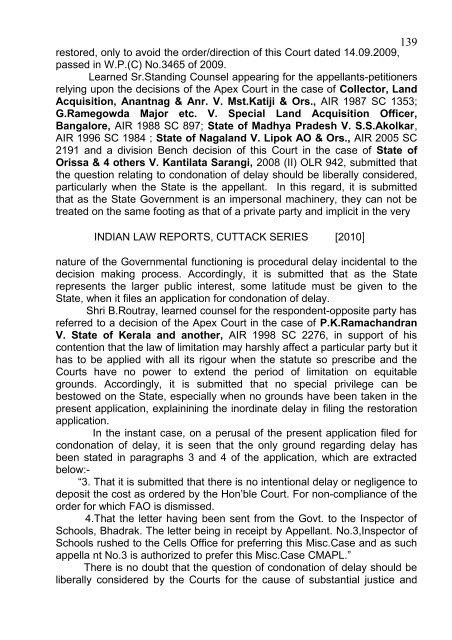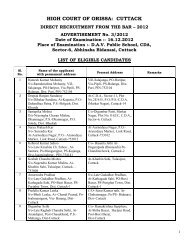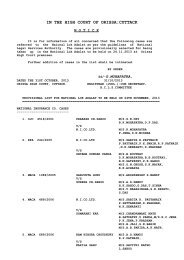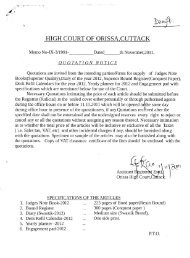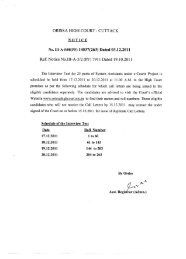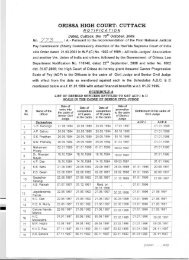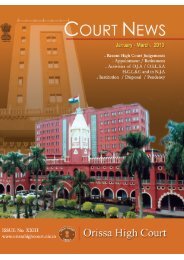ORIGINAL JURISDICTION - Orissa High Court
ORIGINAL JURISDICTION - Orissa High Court
ORIGINAL JURISDICTION - Orissa High Court
Create successful ePaper yourself
Turn your PDF publications into a flip-book with our unique Google optimized e-Paper software.
139<br />
restored, only to avoid the order/direction of this <strong>Court</strong> dated 14.09.2009,<br />
passed in W.P.(C) No.3465 of 2009.<br />
Learned Sr.Standing Counsel appearing for the appellants-petitioners<br />
relying upon the decisions of the Apex <strong>Court</strong> in the case of Collector, Land<br />
Acquisition, Anantnag & Anr. V. Mst.Katiji & Ors., AIR 1987 SC 1353;<br />
G.Ramegowda Major etc. V. Special Land Acquisition Officer,<br />
Bangalore, AIR 1988 SC 897; State of Madhya Pradesh V. S.S.Akolkar,<br />
AIR 1996 SC 1984 ; State of Nagaland V. Lipok AO & Ors., AIR 2005 SC<br />
2191 and a division Bench decision of this <strong>Court</strong> in the case of State of<br />
<strong>Orissa</strong> & 4 others V. Kantilata Sarangi, 2008 (II) OLR 942, submitted that<br />
the question relating to condonation of delay should be liberally considered,<br />
particularly when the State is the appellant. In this regard, it is submitted<br />
that as the State Government is an impersonal machinery, they can not be<br />
treated on the same footing as that of a private party and implicit in the very<br />
INDIAN LAW REPORTS, CUTTACK SERIES [2010]<br />
nature of the Governmental functioning is procedural delay incidental to the<br />
decision making process. Accordingly, it is submitted that as the State<br />
represents the larger public interest, some latitude must be given to the<br />
State, when it files an application for condonation of delay.<br />
Shri B.Routray, learned counsel for the respondent-opposite party has<br />
referred to a decision of the Apex <strong>Court</strong> in the case of P.K.Ramachandran<br />
V. State of Kerala and another, AIR 1998 SC 2276, in support of his<br />
contention that the law of limitation may harshly affect a particular party but it<br />
has to be applied with all its rigour when the statute so prescribe and the<br />
<strong>Court</strong>s have no power to extend the period of limitation on equitable<br />
grounds. Accordingly, it is submitted that no special privilege can be<br />
bestowed on the State, especially when no grounds have been taken in the<br />
present application, explainining the inordinate delay in filing the restoration<br />
application.<br />
In the instant case, on a perusal of the present application filed for<br />
condonation of delay, it is seen that the only ground regarding delay has<br />
been stated in paragraphs 3 and 4 of the application, which are extracted<br />
below:-<br />
“3. That it is submitted that there is no intentional delay or negligence to<br />
deposit the cost as ordered by the Hon’ble <strong>Court</strong>. For non-compliance of the<br />
order for which FAO is dismissed.<br />
4.That the letter having been sent from the Govt. to the Inspector of<br />
Schools, Bhadrak. The letter being in receipt by Appellant. No.3,Inspector of<br />
Schools rushed to the Cells Office for preferring this Misc.Case and as such<br />
appella nt No.3 is authorized to prefer this Misc.Case CMAPL.”<br />
There is no doubt that the question of condonation of delay should be<br />
liberally considered by the <strong>Court</strong>s for the cause of substantial justice and


